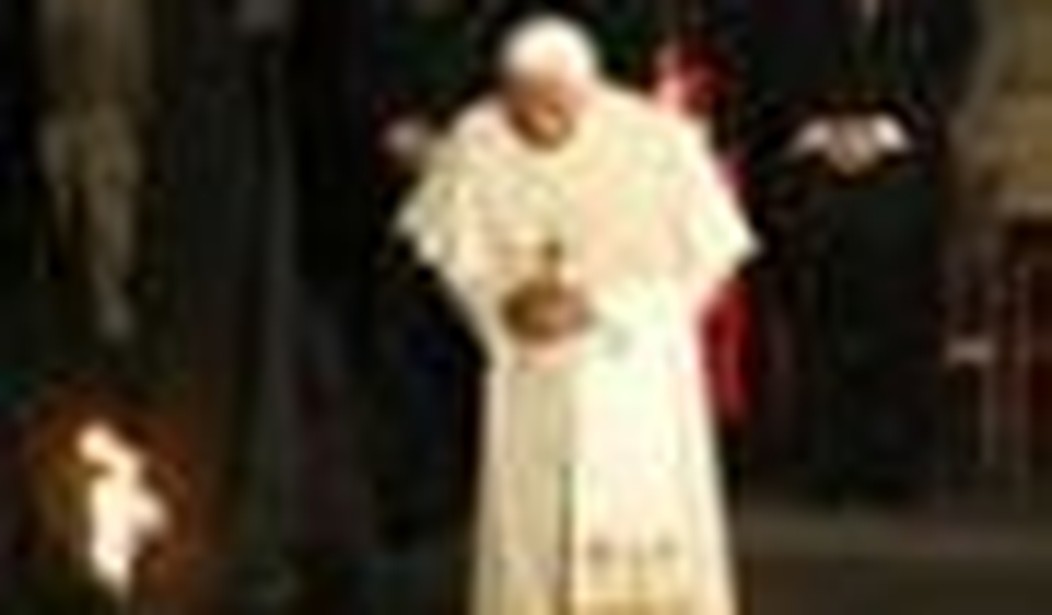Israel’s unending struggle is written into her very name, Isra-El: “struggles with God.” Since its formation in 1948, the world has watched the tumult of the modern state of Israel and one thing remains unclear: is the “struggle” between Israel herself and God, or between Israel and the world, with God beside her?
Either way, that Israel will always struggle should by now be understood, whether viewed through the lenses of history or scripture.
Pope Benedict XVI has been traveling about the Holy Land as a “pilgrim of peace” and each step — whether in Jerusalem or Bethlehem or Nazareth — has been a necessarily careful one, as though the built-up sludge of incessant struggle may hide a stumbling block. The squabbling children of Abraham who populate this land cry out for just resolutions to their conflicts, then wearily reject them all. Like nesting birds nicking shiny things, they grab at anything that offers a gleam of support for their staked claim and reject what does not shine their way.
Thus, at an “inter-religious dialogue” the pontiff’s call for mutual understanding inspired a Jew-hating diatribe by Sheikh Tayseer Tamimi and the pope’s encouragement at Yad Vashem was taken, by some, for coldness.
Pope John Paul II was a dramatic pipe organ of a man; with a chord he could shake a crowd and bring it to its knees. When he spoke at Yad Vashem in 2000 his remarks were emotional and Israel’s wail, ever-present its heaving bosom of struggle, found some release in them. By comparison, Pope Benedict XVI is a cerebral piano; he builds a thoughtful piece, note by note, and trusts that the listener will follow along:
I have come to stand in silence before this monument, erected to honor the memory of the millions of Jews killed in the horrific tragedy of the Shoah. They lost their lives, but they will never lose their names: these are indelibly etched. … Their names are forever fixed in the memory of Almighty God.
Eschewing emotionalism for pragmatism, Benedict’s less empathetic remarks met mixed reviews. Some Jews, looking for a personal balm, complained that they’d “missed the tone of shared grief.” Others said empathy-seeking “missed the point,” that the pope was redirecting attention away from past horrors, in order to focus on present dangers in the rising of a “new” global anti-Semitism.
A reading of all of Benedict’s remarks throughout this pilgrimage suggests that he is doing more; he is pushing aside entangled, energy-sapping emotionalism to propose a reinvestment in our shared humanity. This last great man of the 20th century lived through Nazism and statism and he understands the societal weaknesses that spawned them. His speeches in the Holy Land are of a piece, meant to paint the “big picture.” Yes, Israel has enemies who would push all Jews into the sea, and yes, Palestinians must have a homeland if they are to have any hope, and yes, both of these truths are tragically complex. But any solutions, suggests Benedict, will have to be built upon the foundation of “our common belief in one God, the Father of the human family.”
This seems a simplistic response to ancient wounds and rivalries, where grudges are long and trust has been shattered, but Benedict knows that a strengthened family can be a bulwark against encroaching evil and the abode of healing and grace. A healthy family knows no “stalemate of fear.”
In Nazareth, he said:
In the family each person, whether the smallest child or the oldest relative, is valued for himself or herself, and not seen simply as a means to some other end. Here we begin to glimpse … the essential role of the family as the first building block of a well-ordered and welcoming society. … Let us reaffirm here our commitment to be a leaven of respect and love in the world around us. … Let everyone reject the destructive power of hatred and prejudice, which kills men’s souls before it kills their bodies!
Emotions have their place, but at Nazareth, something good comes as Benedict speaks the truth: nothing will change until the squabbling children of Abraham can remember that they are family, first. Not anonymous “others,” but children of one Almighty Parent who loved them equally into being and who knows them “by name.”
And if their name is Israel, this Parent has promised, they will not struggle alone.









Join the conversation as a VIP Member